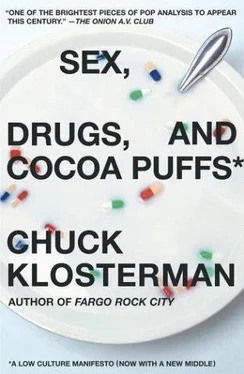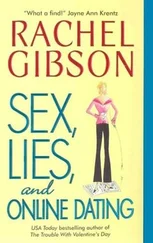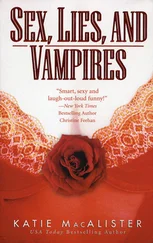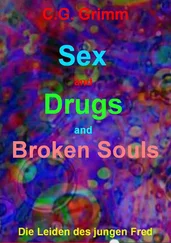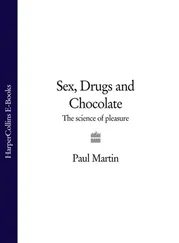However, athletes aren’t the worst part about being a sportswriter; after a few months, the players merely become literary devices. The worst part about being a sportswriter is that no one will ever have a normal conversation with you for the rest of your life. Everyone you meet will either (a) want to talk about sports, or (b) assume you want to talk about sports. Strangers will feel qualified to walk up to you in a café and complain about Rasheed Wallace; upon your introduction, your girlfriend’s father will immediately ask you oddly specific questions about the New York Rangers. You may have insightful thoughts on the Middle East, but no one will care; they will be interested in your thoughts on middle relieving.
Over time, you will see your life disappear into sweat and contract negotiations and descriptions of the wishbone offense. And you will hate it. And normal sports fans deserve to know this. They deserve to know that the people telling them about the Utah Jazz enjoy pro basketball about as much as Catholic priests enjoy watching The Thorn Birds . I honestly feel the best sports journalism of the last ten years has been Jim Rome’s work on his radio program The Jungle, since Rome seems to be the only man who aggressively accepts one very important truth: The single-best part about loving sports is hating sports.
Celebrity Journalism Is a New Kind of Meaninglessness.
During the summer of 2001, you may recall a temporary hubbub about Tom Junod, a writer for Esquire magazine who did a profile on Michael Stipe of R.E.M. The controversy was that Junod admitted to fabricating much of the story, particularly details that made Stipe appear as an iconoclastic weirdo who stuck pennies on his eyes and consumed packets of sugar for no apparent reason.
My initial reaction to Junod’s piece was that it was the wrong thing to do, and I still feel that way. Considering that almost nobody believes the media as it is, I can’t see how lying on purpose can possibly be to anyone’s benefit. But Junod claims he did this in order to make people reevaluate how the press covers celebrity, and that’s valid. It’s valid because conventional celebrity journalism is inevitably hounded by two problems: Either the subject is lying, or the writer is guessing. Junod just happened to embrace both of those obstacles simultaneously.
The problem with interviewing famous people is that—much of the time—they don’t know anything. And I don’t mean they don’t know about religion or world affairs or physics; I mean they don’t know anything about what they’re supposedly being interviewed about. Quite often, you will see an actor discussing the character he’s playing in a certain film, and he’ll be explaining what kind of person this character is and what that character represents in a metaphoric sense (this happens all the time on Bravo’s Inside the Actors Studio, America’s single most embarrassing TV program). This is crazy. The actor didn’t create that character; a screenwriter did. The actor didn’t decide what the character represents outside the narrative; that’s what the director tries to do. In a big-budget Hollywood movie, the actor has one responsibility: He needs to look visually compelling and recite the lines somebody else wrote for him. That’s the whole gig. But in order to promote movies, actors and actresses need to give interviews at press junkets, because nobody wants to read an interview with some nebbish screenwriter. As a consequence, celebrity journalism is usually just attractive people trying to make up answers to questions they barely understand.
But those fabrications are only half the dilemma; part of the blame must fall on the reporter. It’s almost impossible for journalists to cover celebrities without collapsing into conjecture. Unless they work for a major magazine or a mammoth newspaper, reporters rarely spend much time with the celebrities they cover; very often, an artist will do eight twenty-minute phone interviews with eight different writers in the span of a single morning, and that’s all each writer has to work with. And since this artist probably said the exact same things in all eight interviews, all the writer can do is look at his ten rudimentary quotes and try to figure out how they can be used to prove that this person is somehow interesting.
Great example: In 1998, I interviewed Dave Pirner of the band Soul Asylum. Relative to most alt rockers, he was a pretty good talker; we discussed his liberal political views and the state of the music industry and—very briefly—his defunct relationship with Winona Ryder. All in all, we were on the phone for maybe thirty-five minutes. I started writing my Pirner profile as soon as the call ended, and I found myself using his casual insights to paint an incredibly vivid portrait of both his personal life and the cultural significance of his band. I saw tragic parallels between his ill-fated romance with Ryder and the unavoidable illusion of a meteoric rise to fame, and the whole story turned out to be an amazingly well-constructed psychological profile of a rock star who needed to pass the apex of his fame before he could take the time to appreciate what he had lost. It was a very good story. But then something dawned on me: What the fuck do I know about David Pirner? I talked to this dude for thirty-five minutes, and we spent the first ten discussing the coolest bars in uptown Minneapolis. How could I possibly think I gained any meaningful understanding of this man’s existence through one completely innocuous phone conversation? I could have written the whole story without even talking to him, and it wouldn’t have been any more (or less) accurate.
But you know what? My deadline for that Soul Asylum piece was 6:00 P.M. that same day, and I came to this realization at around 5:45. I could not change my life (or his) in fifteen minutes. I ran a spell check on the article and sent it to my editor, and then I went home. And everybody read my story, and everybody fucking loved it.
That’s celebrity journalism.
It Is Assumed You Can’t Read.
If I have learned anything from working in journalism, it’s that people who read newspapers apparently can’t read newspapers. That’s all I’ve ever been told. Every discussion I’ve ever had with an editor has stressed that people despise the process of reading. What people want, I am told, are shorter stories that never jump to a different page (stories that jump to different pages are apparently too confusing for people to follow, although it certainly seems like people manage to comprehend books, which tend to be spread over many, many many pages). People also like graphics, especially pie graphs. Photographs are also profoundly important, even if it’s just a photograph of someone standing in front of the T.G.I. Friday’s they happen to manage. And don’t forget about sky boxes! People desperately need “sky boxes,” which are eye-catching charts that tell them about news stories hidden inside the same paper everyone assumes they don’t want to read. HOWEVER, the one thing nobody wants is sentences, and they certainly don’t want paragraphs. People despise paragraphs. Focus groups have proven this.
Let me briefly describe what happened: At some unspecific point in history (during the height of the Vietnam War, probably), the television industry started kicking the newspaper industry’s ass, mostly because TV was able to deliver the bare bones of information at a much faster speed. It was like newspapers were a horse and buggy, and TV was a train. So how did newspaper magnates combat this dilemma? By trying to design a really, really fast horse.
What newspapers tried to do was make reading feel like watching TV. Logically, they should have tried to do the opposite; they should have started writing longer, more complex stories, and they should have tried to deliver all the things the broadcast medium does not have the capacity to offer. But newspapers did the opposite. They tried to compete with the broadcast media by being flashier and less intellectual, which is why the newspaper industry is now controlled by page designers.
Читать дальше
